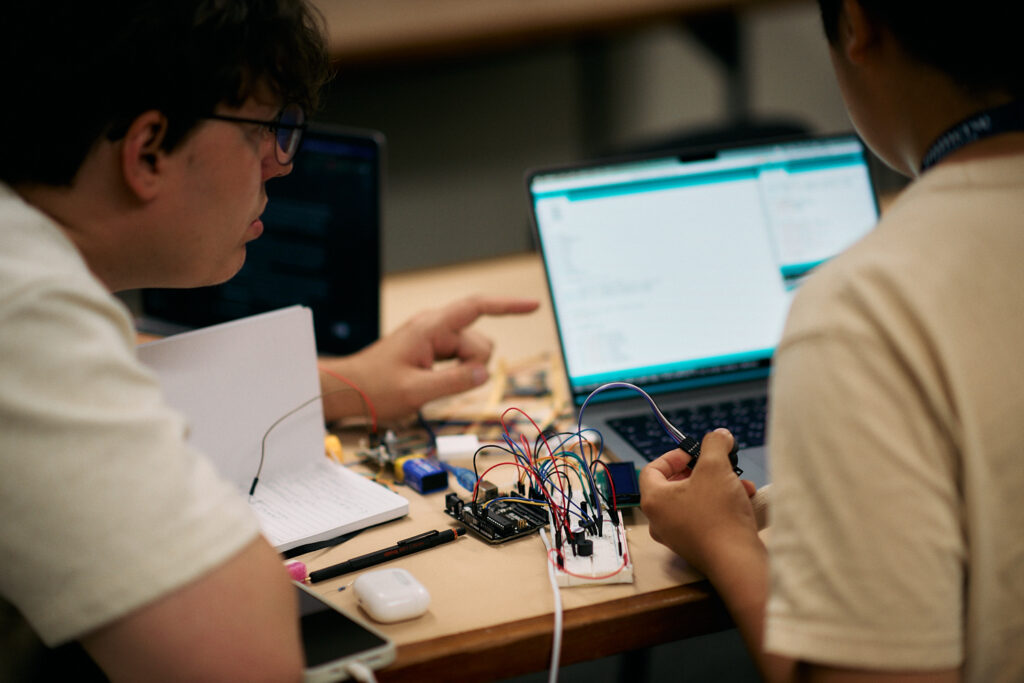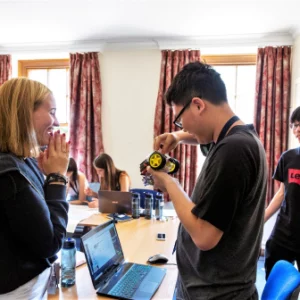Completing a research project in physics is an excellent way to prepare for higher study and boost your career prospects if you are fascinated by science and want to explore the nature and properties of matter and energy.
But first, you must select a great research topic – it needs to be relevant, engaging, and most importantly, of interest to you.
What Makes a Great Research Topic in Physics?
Physics has more than a dozen “branches”. From thermodynamics and electromagnetism to relativity and nuclear reactions, there are numerous areas you can focus on for your EPQ project. Several factors that define a great research topic include:
- Interest: Choose a topic that makes you excited about science and physics, and aligns with your future aspirations. Do you want to be an engineer or data scientist?
- Unique: Within your chosen field of physics, try to bring a unique perspective or analyse new data to make your project fresh and engaging.
- Manageable: Ensure the scope of your research is achievable, and that you have the tools to complete it successfully within a given time frame.
- Relevant: A topic should address real-world challenges or solve a common problem. Practical relevance will add value to your research.
100 Research Ideas for Physics
Research project ideas about theoretical physics and fundamental principles:
#1: The nature of black hole singularities
#2: Analysing Einstein’s Theory of Relativity
#3: Investigating the curvature of space-time
#4: The effects of relativity on space travel
#5: Exploring recent developments in string theory
#6: The discovery and significance of Higgs boson
#7: Exploring the Standard Model of particle physics
#8: Investigating the M-Theory
#9: The behaviour of quarks in hadrons
#10: Investigating quantum entanglement in particles
#11: The role of neutrinos in the universe
#12: How do particles acquire mass?
#13: Exploring the physics of particle-wave duality
#14: The behaviour of photons in quantum electrodynamics
#15: The role of symmetry in physics
#16: Nuclear fusion: Is it possible?
#17: The role of magic numbers in nuclear shell models
#18: Plasma: What is it, and how is it created?
#19: The multiverse theory: What are the implications?
#20: Explaining the physics of time dilation
#21: How will quantum computing revolutionise technology?
Research project ideas about astrophysics and space exploration:
#22: The theories explaining dark matter interactions
#23: How do galaxies evolve over time?
#24: Do supermassive black holes exist? Theory versus evidence
#25: Exploring the latest developments in astrophysics
#26: How do solar flares affect Earth’s atmosphere?
#27: How are physicists shaping space exploration?
#28: How does dark matter influence galaxy formation?
#29: Investigating the works of Stephen Hawking
Research project ideas about quantum mechanics and related theories:
#30: What experiments have validated Bell’s theorem?
#31: Discussing the Feynman diagram
#32: Exploring phase transitions in quantum fields
#33: The behaviour of photons in quantum electrodynamics
#34: Exploring the significance of Heisenberg’s uncertainty principle
#35: Schrödinger’s contributions to quantum chemistry
#36: The quantum mechanics of photosynthesis
Research project ideas about classical physics and mechanics:
#37: Investigating the efficiency of different gear ratios
#38: How is Bernoulli’s principle applied?
#39: The principles of buoyancy and fluid mechanics
#40: Investigating Newton’s laws of motion
#41: The mechanics of a simple pendulum
#42: What factors influence projectile motion paths?
#43: The principles behind uniform circular motion
#44: How does torque affect rotational motion?
#45: How does inertia affect objects in motion?
#46: Exploring the causes of surface tension
#47: The effects of static and kinetic friction
#48: How does thermal expansion affect materials?
Research project ideas about electromagnetism and wave physics:
#49: How does light behave in a vacuum?
#50: Exploring the physics of sound cancellation technology
#51: How do electric circuits work?
#52: What are the principles behind electric motors?
#53: How do batteries store and release energy?
#54: How is magnetism created in matter?
#55: The science behind magnetic levitation
#56: How does electricity flow through conductive materials?
#57: How does sonar work in submarines?
#58: The physics of sound waves in air
#59: How do different musical instruments produce sound?

Research project ideas about thermodynamics and energy application:
#60: The concept of entropy in thermodynamics
#61: What are the principles behind radiation therapy?
#62: The physics of cooking
#63: The role of physics in renewable energy
#64: Investigating thermal expansion and its applications
#65: The effects of colour on heat absorption
#66: How do greenhouse gases trap heat in the atmosphere?
#67: How can chaos theory be applied to weather patterns?
#68: What are the characteristics of an ideal gas?
#69: How does ultrasound work for medical diagnostics?
Research project ideas about practical and applied physics:
#70: Exploring renewable energy innovations
#71: The physics of semiconductors in electronics
#72: The physics behind earthquake waves
#73: How do aeroplanes fly: The science behind flight
#74: Investigating the mechanics of computer tomography
#75: Exploring phase transitions in materials
#76: How does medical physics contribute to patient safety?
#77: How is particle physics applied in medicine?
#78: Practical applications of mass-energy equivalence
#79: Investigating the efficiency of different gear ratios
Research project ideas about biophysics:
#80: The physics of blood flow in the circulatory system
#81: How do enzymes catalyse reactions?
#82: Exploring biophysics applications
#83: The role of proteins in cellular function
#84: How proteins fold and function
#85: Discussing biophysics in real-world applications
#86: Investigating enzyme functions
#87: The biophysics of muscle contraction
Research project ideas about the environment and climate:
#88: How are glaciers formed?
#89: How does light affect plant growth?
#90: What role do greenhouse gases play in the climate system?
#91: Discussing environmental physics in practical applications
#92: What environmental factors influence the earth’s temperature
#93: Investigating climate change adaptation
#94: Exploring the Novaya Zemlya effect
#95: How has the atmosphere changed during the last 100 years?
Research project ideas about historical and influential figures in physics:
#96: Discussing Oppenheimer’s influence on modern physics
#97: Oppenheimer and the development of nuclear weapons
#98: Galileo’s observations and the heliocentric theory
#99: Einstein’s legacy on popular culture
#100: How did Galileo’s observations support the heliocentric theory?
Create Degree-Level Essays in Physics
Physics is fundamental to our understanding of the universe. There are so many topics and questions to explore; the 100 research ideas listed here can be a starting point for finding a topic that’s right for you.
A research project is just the beginning. If you want to develop your pre-university skills in preparation for higher education and a career in physical sciences, Immerse Education has a program for you. Head to the Immerse Education Physics Online Research Programme Page right now to find out more – we have academics ready and waiting to help you produce degree-level essays!
Join the Immerse Education 2025 Essay Competition
Follow the instructions to write and submit your best essay for a chance to be awarded a 100% scholarship.




















